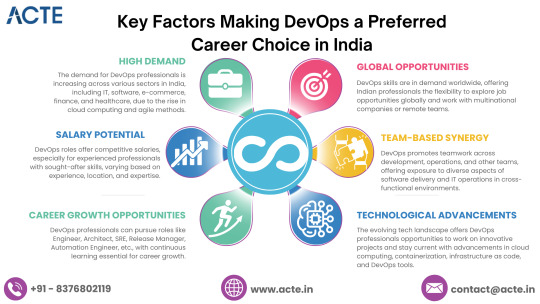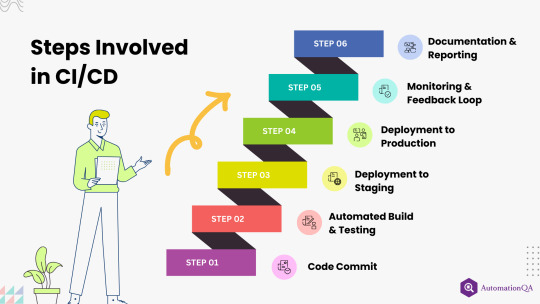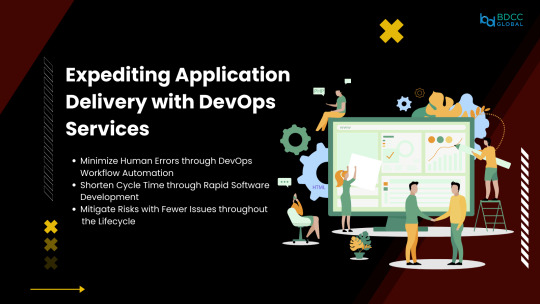#Devops-Continuous-Integration
Explore tagged Tumblr posts
Text
How DevOps Connects to Software Development Process Automation: Improving Quality and Speed | OpsNexa!
Learn how DevOps leverages automation to streamline software development processes, from integration and testing to deployment and monitoring. This article explains how automation in a DevOps environment boosts the speed, How DevOps Relates to Automating Processes in Software Development, consistency, and reliability of software delivery. Discover how automating key tasks enables faster feedback, higher-quality code, and more efficient collaboration between development, operations, and QA teams.
#Devops-Automation#Software-Development-Automation#Devops-in-Software-Development#Automate-with-devops#Devops-Continuous-Integration
0 notes
Text

Continuous Integration (CI) is essential for fast, reliable, and error-free releases. At ITTStar, we implement CI pipelines specifically tailored for financial organizations, ensuring that your deployments are quick and secure. With our expertise, you can accelerate your time-to-market without compromising on security or compliance. Let us help you achieve faster releases while maintaining the highest standards of protection. Get in touch today to discuss how we can streamline your CI pipeline.
0 notes
Text
0 notes
Text
CI/CD Pipeline Using Jenkins | Continuous Integration & Continuous Deployment | DevOps | Simplilearn
In this video, we will learn how to create a CI/CD Pipeline using Jenkins Tool. We’ll also learn about the Importance of Continuous … source
0 notes
Text
AI in DevSecOps: Revolutionizing Security Testing and Code Analysis

DevSecOps, short for Development, Security, and Operations, is an approach that integrates security practices within the DevOps workflow. You can think of it as an extra step necessary for integrating security. Before, software development focused on speed and efficiency, often delaying security to the final stages.
However, the rise in cyber threats has made it essential to integrate security into every phase of the software lifecycle. This evolution gave rise to DevSecOps, ensuring that security is not an afterthought but a shared responsibility across teams.
From DevOps to DevSecOps: The Main Goal
The shift from DevOps to DevSecOps emphasizes applying security into continuous integration and delivery (CI/CD) pipelines. The main goal of DevSecOps is to build secure applications by automating security checks. This approach helps in fostering a culture where developers, operations teams, and security experts collaborate seamlessly.
How is AI Reshaping the Security Testing & Code Analysis Industry?
Artificial intelligence and generative AI are transforming the landscape of security testing and code analysis by enhancing precision, speed, and scalability. Before AI took over, manual code reviews and testing were time-consuming and prone to errors. AI-driven solutions, however, automate these processes, enabling real-time vulnerability detection and smarter decision-making.
Let’s look at how AI does that in detail:
AI models analyze code repositories to identify known and unknown vulnerabilities with higher accuracy.
Machine learning algorithms predict potential attack vectors and their impact on applications.
AI tools simulate attacks to assess application resilience, saving time and effort compared to manual testing.
AI ensures code adheres to security and performance standards by analyzing patterns and dependencies.
As you can imagine, there have been several benefits of this:
Reducing False Positives: AI algorithms improve accuracy in identifying real threats.
Accelerating Scans: Traditional methods could take hours, but AI-powered tools perform security scans in minutes.
Self-Learning Capabilities: AI systems evolve based on new data, adapting to emerging threats.
Now that we know about the benefits AI has, let’s look at some challenges AI could pose in security testing & code analysis:
AI systems require large datasets for training, which can expose sensitive information if not properly secured. This could cause disastrous data leaks.
AI models trained on incomplete or biased data may lead to blind spots and errors.
While AI automates many processes, over-reliance can result in missed threats that require human intuition to detect.
Cybercriminals are leveraging AI to create advanced malware that can bypass traditional security measures, posing a new level of risk.
Now that we know the current scenario, let’s look at how AI in DevSecOps will look like in the future:
The Future of AI in DevSecOps
AI’s role in DevSecOps will expand with emerging trends as:
Advanced algorithms will proactively search for threats across networks, to prevent attacks.
Future systems will use AI to detect vulnerabilities and automatically patch them without human intervention.
AI will monitor user and system behavior to identify anomalies, enhancing the detection of unusual activities.
Integrated AI platforms will facilitate seamless communication between development, operations, and security teams for faster decision-making.
AI is revolutionizing DevSecOps by making security testing and code analysis smarter, faster, and more effective. While challenges like data leaks and algorithm bias exist, its potential is much more than the risks it poses.
To learn how our AI-driven solutions can elevate your DevSecOps practices, contact us at Nitor Infotech.
#continuous integration#software development#software testing#engineering devops#applications development#security testing#application security scanning#software services#nitorinfotech#blog#ascendion#gen ai
0 notes
Text
#DevOps#Continuous Integration (CI)#Continuous Delivery (CD)#devops services#agile and devops#Infrastructure as Code(IaC)#DevSecOps
0 notes
Text
Accelerating Cloud Development: How AWS DevOps is Revolutionizing Software Delivery in 2024
In 2024, businesses are operating in an era where software delivery needs to be faster, more reliable, and more scalable than ever before. The rise of cloud computing has been central to this transformation, and AWS (Amazon Web Services) DevOps has become a key enabler of these advancements. By combining the power of cloud infrastructure with the agility of DevOps practices, AWS DevOps is revolutionizing how organizations develop, deploy, and manage applications.
What is AWS DevOps?
AWS DevOps refers to the combination of AWS’s cloud computing services and DevOps practices to facilitate faster, more efficient software development and deployment. DevOps is a set of practices that automates and integrates the processes between software development and IT operations teams, enabling them to build, test, and release software more quickly and reliably.
AWS offers a wide range of tools and services that support DevOps practices, including continuous integration and continuous delivery (CI/CD), infrastructure as code (IaC), monitoring, and logging. AWS DevOps helps businesses of all sizes adopt cloud-native technologies and streamline their software development lifecycle (SDLC) to meet the demands of the modern digital landscape.
How AWS DevOps is Revolutionizing Software Delivery in 2024
Accelerating Time-to-Market
In today’s competitive landscape, the ability to deliver new features and updates quickly is crucial for business success. AWS DevOps automates various stages of the SDLC, from code development to deployment, reducing the time it takes to release new software. With AWS services like CodePipeline, CodeDeploy, and CodeBuild, development teams can automate their CI/CD pipelines, ensuring that code is automatically tested and deployed as soon as it’s ready. This eliminates manual steps and accelerates time-to-market, allowing businesses to respond to market demands faster.
Scalability and Flexibility
AWS’s cloud infrastructure provides unparalleled scalability, allowing businesses to scale their applications up or down based on demand. When combined with DevOps practices, AWS enables organizations to dynamically adjust resources, optimize performance, and minimize costs. For example, AWS Elastic Beanstalk automatically handles the deployment, load balancing, scaling, and monitoring of applications, freeing development teams to focus on innovation rather than infrastructure management. This scalability makes AWS DevOps a powerful tool for both startups and large enterprises.
Enhanced Security and Compliance
Security is a top priority in cloud development, and AWS DevOps helps organizations integrate security into every stage of the SDLC. AWS provides a suite of security tools, such as AWS Identity and Access Management (IAM), AWS Shield, and AWS Key Management Service (KMS), which enable teams to enforce security best practices and meet compliance requirements. By incorporating DevSecOps principles, AWS DevOps ensures that security checks are automated and embedded into the CI/CD pipeline, helping organizations identify vulnerabilities early and prevent security breaches.
Infrastructure as Code (IaC)
Infrastructure as Code (IaC) is a core principle of DevOps, and AWS DevOps takes IaC to the next level with services like AWS CloudFormation and AWS CDK (Cloud Development Kit). IaC allows developers to define, provision, and manage infrastructure using code, ensuring consistency and reducing human error. With AWS CloudFormation, teams can create and deploy cloud resources using templates, while AWS CDK provides a higher-level abstraction for defining infrastructure in familiar programming languages. This approach allows for automated, repeatable infrastructure deployments, leading to more reliable and efficient operations.
Monitoring and Logging
Monitoring and logging are essential for maintaining the health and performance of applications in the cloud. AWS DevOps offers powerful monitoring tools, such as Amazon CloudWatch and AWS X-Ray, which provide real-time insights into application performance, resource utilization, and system health. These tools enable teams to detect and resolve issues quickly, minimizing downtime and ensuring a seamless user experience. Automated alerts and dashboards help operations teams stay on top of system performance, while logging services like AWS CloudTrail provide detailed audit logs for security and compliance purposes.
Cost Optimization
Cost efficiency is a critical factor in cloud development, and AWS DevOps enables organizations to optimize their cloud spending. By automating resource provisioning and scaling, AWS DevOps helps businesses ensure that they are only using the resources they need, reducing waste and lowering operational costs. Tools like AWS Cost Explorer and AWS Trusted Advisor provide insights into resource utilization and offer recommendations for optimizing costs. Additionally, the pay-as-you-go pricing model of AWS allows businesses to align their expenses with their actual usage, further enhancing cost efficiency.
Collaborative Development Environment
AWS DevOps fosters a collaborative environment between development and operations teams, breaking down silos and enabling continuous collaboration throughout the SDLC. With services like AWS CodeCommit and AWS CodeStar, teams can work together on code repositories, manage projects, and track progress in real-time. This collaborative approach ensures that everyone is aligned, reducing bottlenecks and improving overall productivity. By integrating with popular DevOps tools like GitHub, Jenkins, and Slack, AWS DevOps creates a seamless development workflow that encourages communication and collaboration.
Real-World Applications of AWS DevOps
AWS DevOps is being adopted by organizations across various industries to drive digital transformation. For example:
E-commerce platforms are using AWS DevOps to continuously deliver new features and updates, ensuring a seamless shopping experience for customers.
Healthcare providers are leveraging AWS DevOps to manage sensitive patient data securely while delivering high-performance telemedicine applications.
Financial services companies are using AWS DevOps to build scalable, secure, and compliant applications that meet regulatory requirements.
These real-world applications highlight the versatility and power of AWS DevOps in driving innovation and operational excellence.
Learn AWS DevOps and MERN Stack Development with Network Rhinos
As the demand for AWS DevOps expertise continues to rise, mastering AWS DevOps can open up exciting career opportunities. If you’re interested in learning AWS DevOps and becoming a cloud development expert, Network Rhinos offers comprehensive training in AWS DevOps course in Chennai and Bangalore.
Our AWS DevOps course is designed to provide hands-on experience with AWS services and DevOps tools, equipping you with the skills to automate software delivery, manage cloud infrastructure, and ensure security and compliance. You’ll learn how to build CI/CD pipelines, implement IaC, and optimize cloud resources, all while gaining insights from industry experts.
Additionally, if you're interested in full-stack development, our MERN Stack developer course covers MongoDB, Express.js, React.js, and Node.js, giving you the skills to build dynamic web applications from start to finish. Whether you choose AWS DevOps, MERN Stack development, or both, Network Rhinos has the courses to help you succeed in today’s cloud-driven world.
Conclusion
AWS DevOps is revolutionizing software delivery in 2024 by enabling faster, more secure, and scalable cloud development. Through automation, scalability, and security integration, AWS DevOps empowers organizations to innovate and meet the demands of the modern digital landscape. As cloud computing continues to evolve, mastering AWS DevOps is becoming essential for developers and IT professionals alike.
If you’re ready to accelerate your cloud development journey, Network Rhinos is here to help. Join our AWS DevOps or MERN Stack developer courses in Chennai or Bangalore and build a successful career in cloud and full-stack development today.
#cloud development#continuous integration (CI)#continuous delivery (CD)#infrastructure as code (IaC)#monitoring and logging#scalability and flexibility#AWS#Devops#amazon web services
1 note
·
View note
Text
Master DevOps: Your Complete Guide and Roadmap | DevOps Online Training

Introduction to DevOps
In today's rapidly evolving technological landscape, the need for streamlined and efficient software development practices has never been greater. Enter DevOps—a culture, philosophy, and set of practices that bring development (Dev) and operations (Ops) together to improve collaboration, integration, and automation throughout the software development lifecycle. DevOps is not just a buzzword; it's a transformative approach that enables organizations to deliver high-quality software faster and more reliably. If you're looking to build a career in this field, DevOps Online Training is your gateway to mastering the skills required to excel in this domain.
What is DevOps?
DevOps is a combination of practices, tools, and cultural philosophies designed to increase an organization's ability to deliver applications and services at high velocity. By breaking down the traditional silos between development and operations teams, DevOps fosters a culture of collaboration, where both teams work together throughout the entire software development lifecycle. This collaboration leads to faster development, more frequent deployment of updates, and higher overall software quality.
At its core, DevOps emphasizes automation, continuous integration, continuous delivery (CI/CD), and monitoring. The goal is to minimize manual intervention, reduce errors, and improve the efficiency of software development and deployment. Through DevOps Online Training, you can learn how to implement these practices in real-world scenarios, making you an invaluable asset to any tech organization.
How DevOps Works
DevOps is built on a set of principles and practices that enable organizations to build, test, and deploy software rapidly and efficiently. Here's how DevOps works in practice:
1. Continuous Integration and Continuous Deployment (CI/CD)
Continuous Integration (CI) is the practice of merging code changes frequently, often multiple times a day, into a shared repository. Automated testing is then conducted to identify and resolve issues early in the development process. Continuous Deployment (CD) takes this a step further by automatically deploying code changes to production after passing the CI pipeline. Together, CI/CD reduces the time between writing code and delivering it to customers, ensuring that software updates are released frequently and reliably.
2. Automation
Automation is a critical component of DevOps. From building and testing code to deploying and monitoring applications, automation helps streamline the entire software development lifecycle. By automating repetitive tasks, teams can focus on more strategic activities, such as optimizing code and improving system performance. Automation tools like Jenkins, Ansible, and Puppet are commonly used in DevOps to create efficient, repeatable processes.
3. Infrastructure as Code (IaC)
Infrastructure as Code (IaC) is the practice of managing and provisioning computing infrastructure through machine-readable scripts rather than manual processes. This approach allows teams to automate the setup and configuration of environments, ensuring consistency across development, testing, and production stages. Tools like Terraform and AWS CloudFormation are popular choices for implementing IaC.
4. Monitoring and Logging
Effective monitoring and logging are essential to maintaining the health and performance of applications in a DevOps environment. By continuously monitoring systems and capturing logs, teams can identify and resolve issues before they impact end-users. Tools like Prometheus, Grafana, and ELK Stack are widely used for monitoring and logging in DevOps.
5. Collaboration and Communication
DevOps is as much about culture as it is about technology. A key aspect of DevOps is fostering a culture of collaboration and communication between development, operations, and other stakeholders. This collaboration ensures that everyone is aligned with the project's goals and that issues are addressed quickly. Tools like Slack, Microsoft Teams, and Jira facilitate communication and collaboration in a DevOps environment.
6. Security in DevOps (DevSecOps)
As security becomes increasingly important in software development, DevOps practices have evolved to include security as a core component. DevSecOps integrates security into every stage of the software development lifecycle, ensuring that security vulnerabilities are identified and addressed early in the process. By adopting DevSecOps practices, organizations can build more secure applications without compromising on speed and agility.
The Roadmap to Becoming a DevOps Engineer
Becoming a DevOps engineer requires a combination of technical skills, practical experience, and a deep understanding of DevOps principles. Here's a step-by-step roadmap to guide you on your journey:
1. Understand the Basics of DevOps
Before diving into specific tools and technologies, it's important to understand the fundamental principles of DevOps. Learn about the core concepts of CI/CD, automation, IaC, and monitoring. DevOps Online Training can provide you with a solid foundation in these areas, helping you grasp the essential elements of DevOps.
2. Gain Proficiency in Programming and Scripting
A strong foundation in programming and scripting is essential for a DevOps engineer. Start by learning a programming language like Python, Ruby, or Go, as well as scripting languages like Bash or PowerShell. These skills will enable you to automate tasks, write custom scripts, and work with various DevOps tools.
3. Master Version Control Systems
Version control systems (VCS) like Git are critical to DevOps practices. Learn how to use Git for version control, branching, and merging code. Understand how to collaborate with other developers using GitHub, GitLab, or Bitbucket. Version control is a fundamental skill that every DevOps engineer must possess.
4. Get Hands-On with CI/CD Tools
CI/CD is at the heart of DevOps, so gaining hands-on experience with CI/CD tools is crucial. Learn how to set up and configure Jenkins, CircleCI, or Travis CI to automate the build, test, and deployment processes. DevOps Online Training often includes practical labs and exercises that allow you to practice using these tools in real-world scenarios.
5. Learn About Infrastructure as Code (IaC)
IaC is a key practice in DevOps, enabling teams to manage and provision infrastructure programmatically. Familiarize yourself with IaC tools like Terraform, AWS CloudFormation, and Ansible. Learn how to write scripts that automate the creation and configuration of infrastructure, ensuring consistency across environments.
6. Develop Cloud Computing Skills
Cloud computing is an integral part of DevOps, as it provides the scalability and flexibility needed for modern software development. Gain proficiency in cloud platforms like AWS, Azure, or Google Cloud. Learn how to deploy applications to the cloud, manage cloud resources, and work with cloud-based DevOps tools.
7. Enhance Your Automation Skills
Automation is a cornerstone of DevOps, so it's essential to master automation tools and techniques. Learn how to automate tasks using tools like Jenkins, Puppet, and Chef. Understand how to create automated workflows that integrate with other DevOps tools and processes.
8. Learn About Monitoring and Logging
Effective monitoring and logging are crucial for maintaining the health of applications in a DevOps environment. Familiarize yourself with monitoring tools like Prometheus and Grafana, as well as logging tools like the ELK Stack. Learn how to set up monitoring dashboards, create alerts, and analyze logs to identify and resolve issues.
9. Embrace DevSecOps Practices
Security is a critical aspect of DevOps, and understanding DevSecOps practices is essential for a successful career in this field. Learn how to integrate security into the CI/CD pipeline, conduct security testing, and implement security best practices throughout the software development lifecycle.
10. Gain Practical Experience
Theory alone is not enough to become a proficient DevOps engineer. Hands-on experience is crucial. Work on real-world projects, contribute to open-source DevOps projects, or participate in internships. Practical experience will help you apply the skills you've learned and build a portfolio that showcases your expertise.
11. Obtain DevOps Certifications
Certifications can validate your skills and make you stand out in the job market. Consider obtaining certifications like AWS Certified DevOps Engineer, Google Cloud DevOps Engineer, or Microsoft Certified: Azure DevOps Engineer Expert. These certifications demonstrate your proficiency in DevOps practices and tools.
12. Stay Updated with Industry Trends
The field of DevOps is constantly evolving, with new tools and practices emerging regularly. Stay updated with industry trends by reading blogs, attending conferences, and participating in online communities. DevOps Online Training programs often include updates on the latest trends and tools in the industry.
13. Build a Strong Professional Network
Networking is important in any career, and DevOps is no exception. Join DevOps communities, attend meetups, and connect with other professionals in the field. Building a strong network can lead to job opportunities, collaborations, and valuable insights.
14. Prepare for DevOps Interviews
As you near the end of your learning journey, it's time to prepare for DevOps interviews. Practice common DevOps interview questions, participate in mock interviews, and review your projects and experiences. DevOps Online Training programs often include interview preparation sessions to help you succeed in landing your first DevOps job.
Conclusion
DevOps is a powerful approach that has revolutionized the way software is developed, tested, and deployed. By fostering collaboration between development and operations teams and leveraging automation, CI/CD, and cloud computing, DevOps enables organizations to deliver high-quality software at a rapid pace. Whether you're just starting your career or looking to transition into the field, DevOps Online Training can provide you with the skills and knowledge needed to succeed as a DevOps engineer.
By following the roadmap outlined in this article, you can develop the technical expertise, practical experience, and industry knowledge required to excel in DevOps. Remember to stay updated with the latest trends, build a strong network, and continuously improve your skills.
#devops#devopsonlinetraining#devops engineer#DevOps Roadmap#web development#development#software#Continuous Integration#Continuous Deployment#Cloud Computing#Automation#Software Development#IT Training#cicd#it training institute#it training courses#it training classes
0 notes
Text
#agile development#backend development#conclusion#continuous deployment#continuous integration#deployment#designing#DevOps#DevOps engineer#documentation#FAQs#frontend development#introduction#lean development#maintenance#product manager#Programming Languages#quality assurance engineer#requirement analysis#scrum master#software development#software development jobs#software development life cycle#software engineer#test-driven development#testing#types of software development#user documentation#what is software development
0 notes
Text
Jenkins Docker Compose Install and Configuration
Jenkins Docker Compose Install and Configuration #devops #jenkins #cicd #continuousintegration #continuousdeployment #dockercompose #docker #kubernetes #traefik #ingress #jenkinsagent #jenkinsssh #homelab #homeserver #virtualizationhowto #virtualization
I have been experimenting with many different continuous integration and continuous deployment tools in the home lab. Recently, I have been using GitLab for most of my workflows. However, I have played around with Jenkins in the past and want to get an instance back in the lab environment for comparison with GitLab. In this post, we will look at content around how to install and configure a…

View On WordPress
0 notes
Text
Streamline Your Software Delivery with Goognu’s DevOps Consulting Services
At Goognu, we understand the critical role that DevOps plays in ensuring efficient and reliable software delivery. Our DevOps Consulting Services are designed to empower organizations with the knowledge, tools, and best practices needed to streamline their development and operations processes.
#DevOps consulting services#DevOps consulting companies#DevOps implementation#Continuous Integration
0 notes
Text
Unlocking Opportunities: Is DevOps the Ideal Career Choice in India?
The world of technology is ever-evolving, and each leap spins a new web of opportunities. DevOps, a compound of development (Dev) and operations (Ops) stands at the forefront of this evolution. DevOps has become integral in shaping the modern technology landscape, often cited as a philosophy more than just a career path. If you want to build a career in DevOps, we recommend joining a thorough DevOps Training in Hyderabad. This course offers learners the skills and knowledge necessary for diverse roles within the DevOps domain, including DevOps Engineer, DevOps Architect, Site Reliability Engineer (SRE), Release Manager, Automation Engineer, and beyond. This blog delves into whether DevOps is the ideal career choice in India.
Understanding DevOps
DevOps is about more than just following specific steps. It's a way of working together that encourages developers and operations teams to work closely. This helps in quickly and automatically putting new code into use. DevOps focuses on constantly developing, testing, integrating, deploying, and monitoring software. It's about making getting the latest software ideas out to people easier.
Scope of DevOps in India
India is a burgeoning hub of IT services and technology innovation. The adoption of DevOps methodologies has been accelerating across industries. Many Indian companies, from startups to large enterprises, are integrating DevOps into their workflows to enhance efficiency and competitiveness. Furthermore, the Indian market, given its tech-savvy workforce, shows a potential uptrend for DevOps-oriented projects in the coming years.

Reasons DevOps is an Ideal Career Choice
High Demand for DevOps Professionals
With more companies embracing DevOps practices, the demand for skilled professionals is skyrocketing. DevOps Engineer has been one of the most recruited roles in the Indian tech space recently.
Increased Pay Scales for DevOps Roles
Salaries for DevOps practitioners are among the highest in the tech industry, reflecting the value businesses place on this skill set.
Diverse Job Opportunities
DevOps careers offer variety, from system administration to operations manager; there are many roles.
Career Growth Aspects
DevOps professionals have ample room to grow, from technical roles to management; the ladder is extendable in numerous directions.
Barriers and Challenges in DevOps Career
One must acquire a robust skill set to excel in a DevOps career. This includes understanding tools like Jenkins, Docker, and Kubernetes alongside coding, scripting, and configuring management systems. The cross-functional nature of DevOps also means that professionals must be adept at communication and collaboration. Navigating these challenges can be demanding but ultimately rewarding.
How to Start a Career in DevOps
Starting a career in DevOps involves several paths. Typically, it begins with earning a bachelor's degree in computer science or a related field. Getting certifications from well-known sources like AWS, Red Hat, or Microsoft can also be helpful. Essential skills to develop include software development, system administration, and knowing tools like Git, SVN, or Mercurial. It's critical to gain hands-on experience, which can start with personal projects, helping out with small business systems, and even volunteering.
Success Stories
India has witnessed several success stories of individuals who have carved out lucrative careers in DevOps. By continuously acquiring new skills and adapting to the industry's changing needs, these professionals exemplify the growth potential within DevOps.
Advantages of Choosing DevOps
Job Security
Given the increasing adoption of these practices, job security for DevOps roles is relatively high compared to many other tech jobs.
Problem-Solving Satisfaction
DevOps engineers often report high job satisfaction as they solve complex problems and significantly contribute to their teams.
Cutting-Edge Work
DevOps is at the bleeding edge of technology, and for many professionals, working with the latest tools and practices is a rewarding aspect of the job. Taking this DevOps Online Course helps participants keep up with the newest industry practices and advancements, which can boost their career growth and advancement in the field.

A DevOps career path in India is loaded with opportunities and is ripe for those who wish to be at the intersection of development, operations, and quality assurance. It's a challenging yet rewarding field that offers personal growth and the chance to shape the future landscape of technology. For those with a passion for tech and a drive to continuously learn and adapt, DevOps is the perfect career choice in India.
#devops#information technology#tech#continuous integration#education#technews#cicd#devops course#automation#devops tools
0 notes
Text

Mastering CI/CD magic! 🚀✨ Uncover the streamlined steps behind Continuous Integration and Continuous Deployment.
Elevate your software delivery game with precision and speed. 🛠️💻
0 notes
Text
CI/CD practices have revolutionized the software development process by automating key aspects of building, testing, and deploying software, resulting in faster development cycles
#Devops#Devops Process#Automation Tool#Devops Practice#Software Development Practice#Software Development Lifecycle#Software Development Best Practice#Continuous Deployment#Continuous Integration#CI CD#CI CD Pipeline#CI CD Tools#Continuous Delivery
0 notes
Text

Accelerate your application delivery with DevOps services! 🚀💻
From continuous integration to automated testing, our expert developers are here to help you streamline your software development process and get your apps to market faster.
#applications#devops#continuous integration#automation testing#software development#apps#expert developers#delivery
1 note
·
View note
Text
Exciting Mock interview with DevOps/AWS engineer #devops #cloud #aws #devopsengineer #cloudengineer
Interviewer: Welcome to this exciting mock interview for the role of a DevOps/AWS Engineer! Today, we have an enthusiastic candidate eager to showcase their skills. Let’s begin! Candidate: Thank you! I’m thrilled to be here. Interviewer: Great to have you. Let’s start with a classic question: What attracted you to the field of DevOps and working with AWS? Candidate: DevOps combines my passion…

View On WordPress
#Automation#AWS#CI/CD#cloud engineering#cloud technology#collaboration#communication#continuous integration#cost optimization#cross-functional teams#DevOps#disaster recovery#high availability#IaC#incident management#infrastructure as code#mock interview#performance optimization#scalability#security#tech trends
0 notes